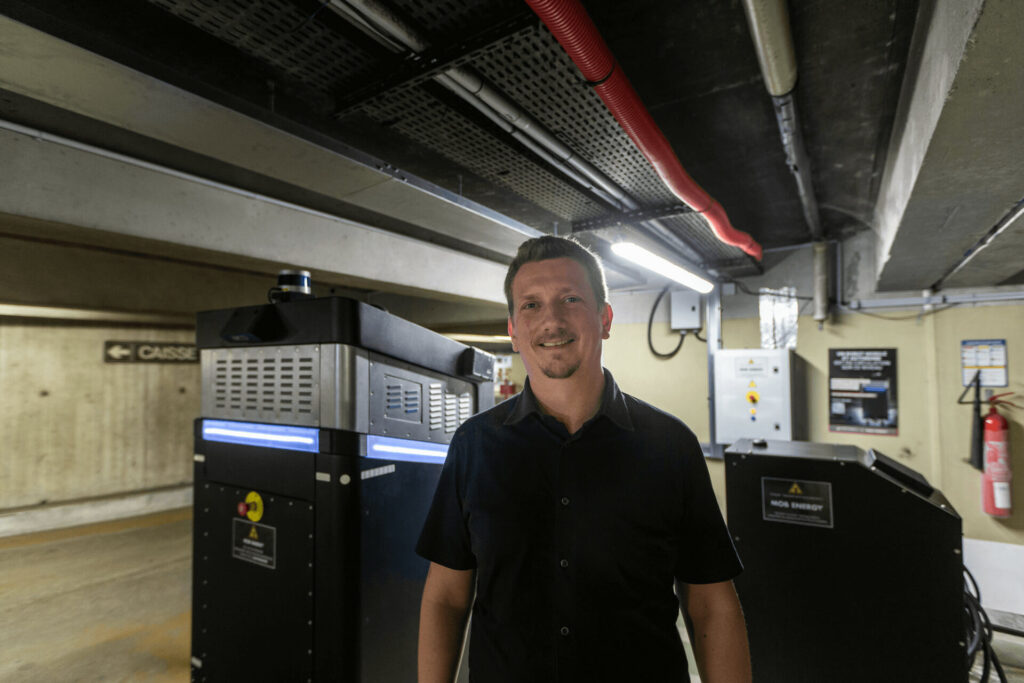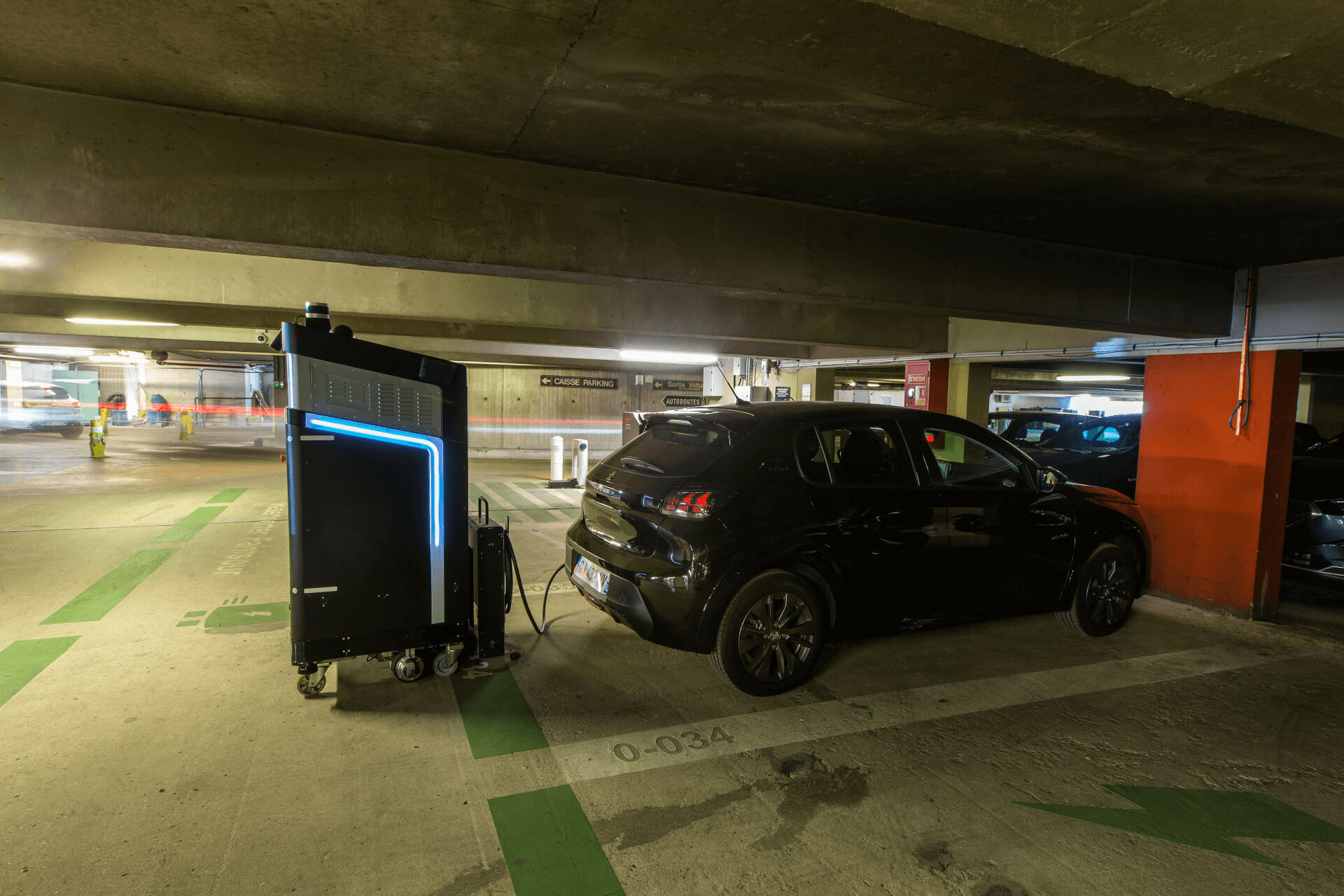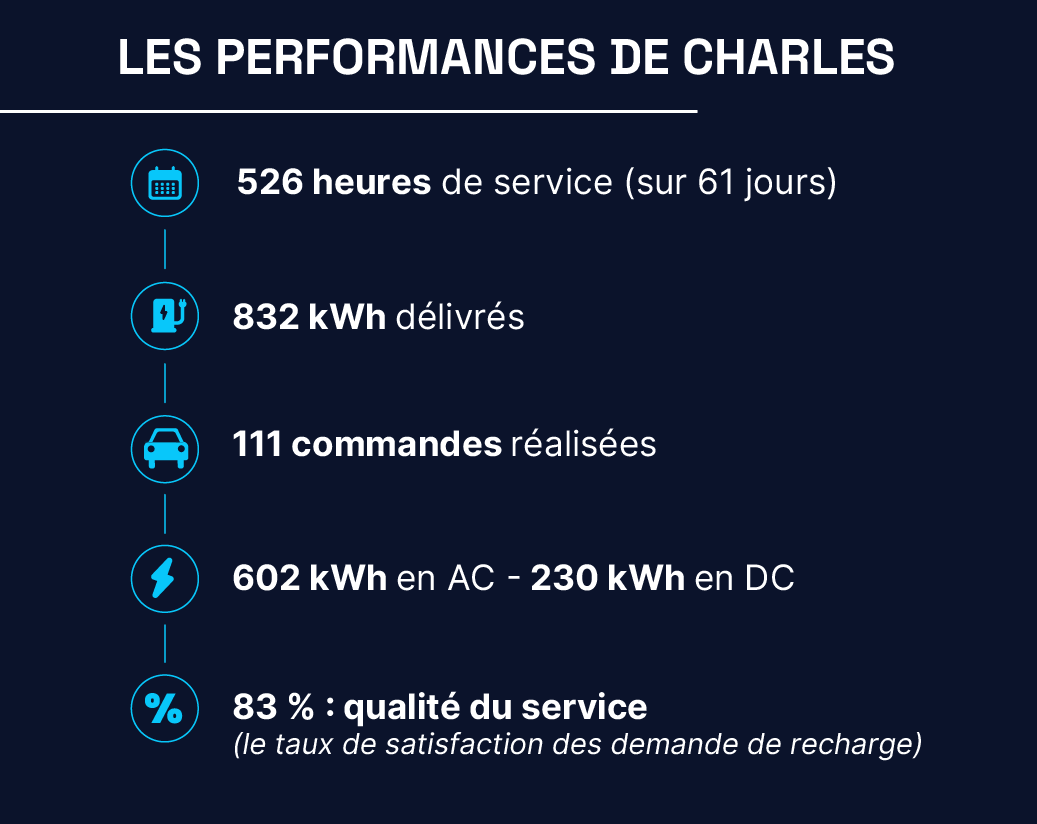Public car park: an autonomous charging robot for PARCUS
Read the testimonial from Pierre-Michel JEMINE, Head of Research, Contracts and Works at the Strasbourg-based SEM Parcus.mobi
We quickly realised that the solution could solve, in one fell swoop, the problems of dedicated spaces for electric vehicles, the power available in our car parks and the problem of car parking.
Pierre-Michel JEMINE
Head of Research, Contracts and Works at Parcus
Parcus, a local authority tool serving Strasbourg’s mobility and parking policy.
At the heart of Strasbourg’s bustling urban life, the semi-public company Parcus has been a major player in the operation of public car parks for 50 years now (anniversary celebrated in 2023). As a genuine “local authority tool, Parcus helps to implement the region’s mobility and parking policy”.
As such, the company is exploring innovative solutions to support the energy transition and meet its many challenges, working closely with some fifteen local public bodies, the Eurometropole and, of course, the City of Strasbourg. It was against this backdrop that Parcus teamed up with Mob-Energy to test Charles, the first autonomous charging robot to be deployed in Europe, with the aim of addressing the problems of charging points being monopolised and the lack of available power in public car parks.
The trial began in October 2022 in the P3 Wilson car park, close to Strasbourg city centre, Les Halles shopping centre and the railway station.
We take a look back at this trial with Pierre-Michel Jemine, Head of Research, Contracts and Works at Parcus.

Pierre-Michel JEMINE
Head of Research, Contracts and Works at Parcus
Today, we are facing a number of major transitions, particularly with regard to environmental and climate issues and the energy crisis. These challenges require users to be more vigilant about how they travel and how they use their vehicles. Among the possible solutions to these challenges, the use of electric cars is one of the main responses that seems to be emerging today.
Why did you choose to experiment with Charles?
At first, I wasn’t fully aware of the potential of this solution. I was initially attracted by the fun and innovative aspect of the Charles robot. But we soon realised that the solution could solve, in one fell swoop, the problems of dedicated parking spaces for electric vehicles, the power available in our car parks and the problem of cars taking up space.
Mobile recharging, an innovative solution to the problems of public car parks
A survey of a panel of subscribers revealed that almost 17% of them own an electric vehicle, which highlights the importance of providing recharging solutions for these electromobilists.
As part of the new parking reform, the City of Strasbourg is aiming to relieve congestion in the city centre, help users move to peripheral parking and promote mobility hubs in the city centre. Parcus, which operates 20 underground and above-ground car parks in Strasbourg, is at the heart of this transformation.
As part of its drive to promote mobility and comply with the French law on the orientation of mobility (LOM), Parcus has studied various solutions aimed at providing a viable, coordinated response involving all the partners involved. With 11,000 parking spaces, a minimum of 550 IRVE-equipped spaces is required by 2025. This volume involves substantial, complex, time-consuming and costly work, particularly when there is a lack of power at the facility, as well as major regulatory and safety obligations (PS regulations).
Aware of the problems of charging points being monopolised and the impact of unused spaces dedicated to electric vehicles, Parcus is actively exploring innovative alternatives to speed up the roll-out of charging infrastructure.
With this spirit of innovation that drives us, we wanted to find different ways of recharging: either faster, but that requires a lot of investment and technical constraints, or by finding an alternative solution.
The aim is to find faster, more efficient and cost-effective solutions, while guaranteeing an optimal charging experience for electric vehicle users. After considering induction charging and intelligent charging solutions, Parcus turned its attention to the Charles robot charger, marking the start of the collaboration with Mob-Energy.

Offer a recharging solution without installing more power in the car park
Even with photovoltaic panels, powering the car park remains complex. With the Charles robot, we can effectively solve the power shortage problem because it recharges in synchronisation with the needs of the structure. This means we have enough power to supply both the car park and the recharging system, especially for our use cases where we’re talking about everyday recharging, for small doses of energy.
Installing recharging solutions requires considerable work. According to Pierre-Michel Jemine, by its very nature, a car park draws on a very large amount of power, and generally doesn’t have enough left over to supply many charging points. In the Wilson car park, for example, there was only 36 kVA available, whereas the main LV board would have to be changed to 490 kVA in order to comply with the LOM law and allow the installation of the appropriate number of IRVEs.
Charles is a solution that recharges at the rate of the car park’s main LV board on a base connected at 15 or 30 kVA, and then delivers the energy to the vehicles. In this way, recharging has very little impact on the power of the structure and avoids lengthy and costly works.
Optimising the use of parking spaces and bollards
Solving the problem of monopolisation of places
We are facing a major problem with cars sitting idle in our car parks. In our Petite France car park, for example, which is equipped with an IRVE, we were surprised to find that some cars were staying connected to the terminal for an average of 21 hours a day. This is where we see the Charles robot as an appropriate solution to this problem.
Suction cars are vehicles that remain parked even after they have finished recharging, taking up a parking space unnecessarily. Parcus chose to test the Charles charging robot because of its ability to solve the problem of charging points being monopolised.
Thanks to a built-in algorithm, the robot is able to schedule and prioritise charging requests. Each driver registers his or her request, indicating the amount of energy required in kWh and the expected parking time. The robot then organises the recharges in the best possible way, aiming to satisfy the user’s request before he or she sets off again.
Electric vehicles disrupt operations.
If you install 50 charging points, the day there is only one electric vehicle in the car park, you leave 49 spaces unused.
Another major problem with too many IRVEs in car parks is that a space equipped with a charging point is a space that is off-limits to combustion-powered vehicles. And even if an EV or plug-in hybrid is parked there, the charging process may already have been completed. Neither the space nor the charging point are optimised. By opting for mobile recharging, Parcus no longer needs to dedicate spaces to recharging, as it is the recharging that comes to the vehicle. The car park is more flexible and remains optimised for all types of parking.
The Parcus robot loader, a striking innovation that’s getting a lot of attention
We were delighted to receive a letter from the Mayor, Jeanne Barseghian, in which she expressed her enthusiasm at the idea of trialling an innovative solution in the area. We had the opportunity to organise several visits and presentations, which generated a real buzz within the city of Strasbourg and with our partners. Charles’ activity also aroused the curiosity of users, and his presence in motion generated real interest in the P3 Wilson car park.
The Charles robot at Parcus in figures
Charles’ trial at Parcus took place over a period of 9 months, including tests, maintenance and a gradual ramp-up. Peak usage was reached between February and April 2023, at a time when there was still untapped service potential, with a robot waiting for a user request 25% of the time.
The partnership with Mob-Energy is proving to be very satisfying, as you are demonstrating a dynamism, a desire to do well and skills that encourage us to support you and to go even further with you. Our goal now is to deploy a Charles robot on a permanent basis at the P3 Wilson car park or elsewhere.

Votre projet sur-mesure
Chaque parking est différent.
Chaque client a ses propres usages de la recharge.
C’est pourquoi nos solutions sont modulables et évolutives, pour que votre infrastructure de recharge réponde parfaitement, et en tout temps, à vos besoins.





